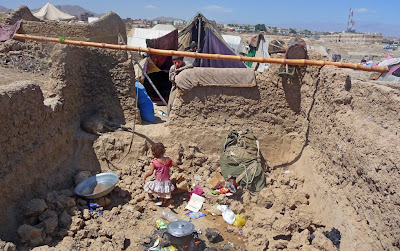In India, which like to call itself the world's largest democracy, a group of squatters were arrested on Wednesday in the Bandra neighborhood of Mumbai, and charged with rioting and unlawful assembly. The activists' accounts and press accounts differ, in that the press doesn't report police violence or the extent of the injuries they inflicted:
--
from an article in sify.com:Activists associated with [Social activist Medha] Patkar alleged that a group of around 500 people were on their way to meet the suburban collector in Bandra when they were arrested without reason. "We had a peaceful meeting with officials at the Maharashtra Housing and Area Development Authority today regarding alleged corruption in the Slum Rehabilitation scheme. When on our way to the collector's office for an appointment we were arrested," said Simpreet Singh, an activist with National Alliance for Peoples' Movement.
--
from a letter circulated to activists:About 300 slum dwellers, along with activists Medha Patkar, Simpreet Singh,
were arrested in Mumbai today evening. More than a thousand slum evictees were
protesting in front of the Maharashtra Housing Area Development Authority
(MHADA) building. They were protesting against atrocities and corruption by the
builders in the name of slum rehabilitation. After a dialogue with the MHADA,
Slum Rehabilitation Authority (SRA) and Mantralaya officials, the
representatives were about to go and meet the collector at 3 p.m. when the
police suddenly lathi-charged without any announcement or warning and began arrest....The arrested women, more than 200 in number, were brutally
lathi-charged and many women were molested and succumbed to injuries on the
skull, legs and arms. When reports last came, the injured were being taken to
hospital in batches.
[thanks, Richard, for sending this my way]




